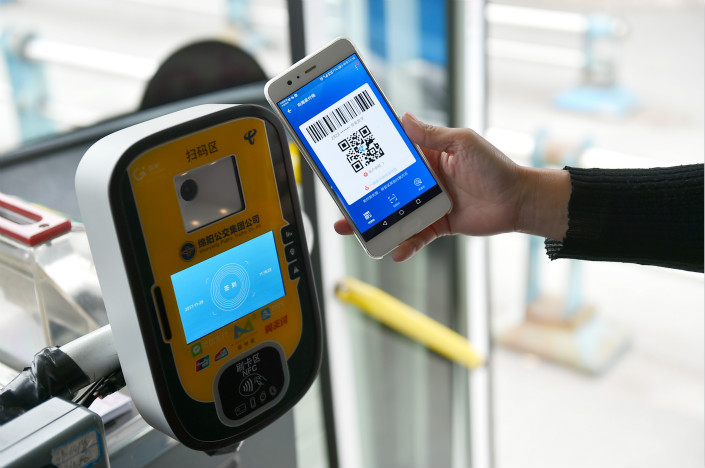Alipay Takes Seat at Front of Bus

* Service that lets bus riders use Alipay to pay fares is set to expand to more than 100 cities next year
* Such payment services allows companies like Alipay to amass large amounts of passenger data, which can be used to generate revenue by targeting advertisers
(Beijing) — Leading electronic payments firm Alipay has embarked on an aggressive campaign to launch its service on buses, making public transportation the latest battleground in its battle for business with internet giant Tencent.
Passengers in at least 50 Chinese cities, from top-tier names like Guangzhou to smaller ones like Anyang in Central China’s Henan province, can now use their smartphone-based Alipay to pay fares on public buses, according to Alipay parent Ant Financial Services Group.
Ant Financial, an affiliate and former division of Alibaba Group Holding Ltd., said the service is set to expand to more than 100 cities next year. The service lets users call up a special QR code on their smartphones for individual cities, and the code can be passed over a scanner on buses to pay fares.
The move heats up the battle for public-transportation customers between Alibaba and Tencent Holdings Ltd., which has launched similar public-bus payment services in at least 55 Chinese cities.
The tech titans are also competing fiercely for subway riders. In January, Shanghai’s subway operator launched a mobile app that allows users to pay using Alipay or state-owned China UnionPay.
That move came two months after Tencent launched a similar program in Guangzhou that allows riders to take the local subway using a QR code generated by the company’s popular WeChat instant messaging app.
Both companies have also competed for years in the private-car and bike-services sectors by backing different operators.
The rollout into public transportation has come relatively late due to the closed nature of such systems, which are usually custom-built by local state-owned operators that often have monopolies in individual cities.
To break the impasse, Alipay has considered investing or forming joint ventures with cities’ operators, said Liu Xiaojie, an Ant Financial manager for public service.
Offering such payment services allows companies like Alipay to amass large amounts of passenger data, which can be used to generate revenue by targeting advertisers, according to Xiao Ying of Wuhan Public Transport Group Corp. Ltd.
Contact reporter Mo Yelin (yelinmo@caixin.com)

- 1China Officials Dismiss Tax Hike Rumors After Tech Selloff
- 2Cover Story: How Gutter Oil Became a Prized Fuel for International Airlines
- 3Prominent Chinese Journalist Liu Hu Detained by Police in Chengdu
- 4Maersk Unit Takes Over CK Hutchison Panama Ports After Court Ruling
- 5China Provinces Set Cautious 2026 Growth Targets
- 1Power To The People: Pintec Serves A Booming Consumer Class
- 2Largest hotel group in Europe accepts UnionPay
- 3UnionPay mobile QuickPass debuts in Hong Kong
- 4UnionPay International launches premium catering privilege U Dining Collection
- 5UnionPay International’s U Plan has covered over 1600 stores overseas






